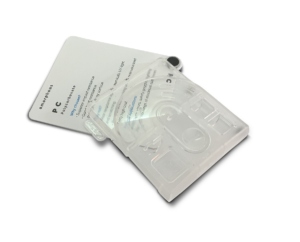
Polycarbonate is an amorphous plastic characterised by excellent impact resistance. It is highly transparent but is commonly used also as opaque. Safety goggles are a good example of the material’s properties. PC is rather susceptible to chemicals and stress corrosion. It is often mixed into other materials to improve their impact resistance.
Although PC is an amorphous material, it is often classified as an engineering plastic due to its high ductility and impact resistance.
Why choose (as opaque)?
- Superior impact resistance
- High service temperature, up to 150°C
- Good mechanical performance
- Good quality surface finish
Why not choose?
- The component is subject to continuous load. PC is prone to stress corrosion cracking.
- Poor chemical resistance. Ammonia gas, lubricants, etc. are poison to PC, especially if under long-term stress.
- Poor scratch resistance. The surface of PC is fairly soft. This can be improved by scratch-resistant lacquer (secondary operation)
- High coefficient of friction
- Poor chemical resistance
- Poor UV resistance
- Fairly expensive material. ABS might do the job for you?
Typical applications:
- Cell phone covers
- Charger housings (e.g. Apple)
- Plastic parts of snow shovels
- Chairs
PC transparent
Why choose?
- Same qualities as opaque
- Good transparency and clarity. PC is commonly found in LED lenses.
Why not choose?
- Same weaknesses as opaque
Typical applications:
- Motorcycle visor
- Safety goggles
- Lighting industry
Note: Despite its poor UV resistance, PC is commonly used in outdoor applications. In such cases, it is dipped into UV-protective silicate coating. This improves scratch resistance as well.
Note: Snowboard bindings are often made of PC, yet they perform well long-term. Good design can, in other words, address the shortcomings of PC.
By examining the Plasticprop sample made of PC, you can draw for example the following conclusions:
- PC is tough. You can turn the tab in the middle of the sample quite far down – and even then, it will meet its yield point and does not break off. Its impact resistance is excellent.
- Transparency is not quite as good as that of PMMA, but is sufficient for most applications.
- The sample is straight and the corner effect minor.
- If you apply a piece of foil tape to the sample surface and leave it in sunlight for a week, a stripe will develop. Outdoor PC applications are usually coated to withstand UV light.
- Heating of a PC sample in an oven reveals that it withstands heat well. A clear softening of the material occurs first between 130°C and 140°C.